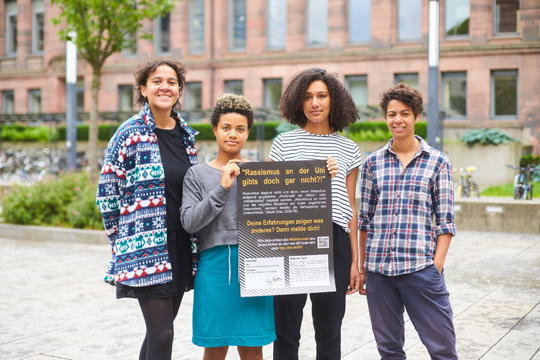I See Something You Don't See
Freiburg, Jul 22, 2019
"But there isn't any racism at the university?!" That's the slogan of a newly founded group called "Black and People of Color." The students emphasize that the question is rhetorical – there have been racist incidents on the University of Freiburg campus, and the group wants to lend an ear to students who have experienced discrimination as a result of their ethnic background or skin color.

The university group "Black and People of Color" aims to raise awareness of the many forms and guises of racism. Photo: Harald Neumann
"But there isn't any racism at the university?!" The exclamation provocatively stands out on one of the group's posters "Black and People of Color," or B_PoC for short. The newly established association wants to offer space to anyone at the University of Freiburg who has experienced racism as a result of their skin color or ethnic background. The words "people of color" describe those who live in a society in which whites are in the majority, but who are considered "non-white" themselves, therefore, skin color as a societal construct – a circumstance that is often used to justify imbalances in power.
Mara Bläsing looks back, saying it started with a deficit. "The three of us were female students who were looking for an opportunity to introduce ourselves as "people of color." Yet there simply wasn't any place at the university for students who had felt racism to share their experiences," she says. Bläsing adds that they were also looking for community. The group has already realized its wish for a protected space for communication. It set up "Safe(r) Space" by the start of winter semester 2018/2019. Students can get together in Belfortstraße 24 to discuss dealing with racism and their experiences.
Active in shaping higher educational policy
Since the summer semester of 2019, the group has also been active in shaping higher educational policy. It has taken over a department in the student government that is directed at students who have experienced racism. At the moment, it is still called the "Department for International Students," but soon it will be renamed as "BIPOC" (black, indigenous and people of color). The group is also present within the General Student Committee (AStA). "That's how we've been able to advance our interests in terms of higher educational policy," explains Bläsing.
Mara Bläsing worked out the current campaign with fellow students Svenja Brendler, Uluka Zimba, and Lolo Mbutcho, as well as the Anti-Discrimination Department. In a questionnaire, people who have experienced or witnessed racism or racial discrimination at the University of Freiburg can recount these incidents anonymously. The group isn't acting unilaterally. "The Rectorate and higher educational policy-makers are behind us and support us," says Zimba, visibly pleased.
A microphone for the community
What is the group aiming to achieve with its project? "We want to gather cases to show how big the problem is at the university and the impact it has on those who've experienced it," explains Brendler. She continues: First of all, it's important to point out that racism is an issue at the university and to raise people's sensitivity for how it can appear and in what forms.
The organizing team perceives itself as a microphone for the community. They say that although they would not like to describe any personal experiences with racism, they do know of major as well as individual cases, and that racism has more subtle aspects to it. Bläsing emphasizes that racist incidents are also when instructors or students in a class use racially-charged expressions, mention certain concepts without enough context, or make generalizations about certain groups within the population. They say it is precisely the more subtle forms of racism that often aren't recognized as such, even though they occur frequently and have a negative impact on those affected by them.
So what will happen after the campaign? The students will document the reports they've received, and verify and evaluate them. It's still uncertain how many people concerned will take part. How the group will continue its work after that depends on the results, explains Bläsing. "Perhaps we could speak with people concerned," she says. The students say they will maintain their commitment in any case, and continue to dedicate themselves to countering racism and working for equal opportunity at the University of Freiburg.
Pascal Lienhard
Join in the debate
The group "Black and People of Color" (B_PoC) meets every second Wednesday at 8 p.m. in the AStA-Haus, on Belfortstraße 24, in Conference Room 1 on the ground floor at "Safe(r) Space," that is open to black, indigenous and people of color. On the other Wednesdays, a higher education policy meeting is held at the same time and in the same place that is also directed towards BIPoC individuals.
Facebook
Instagram

